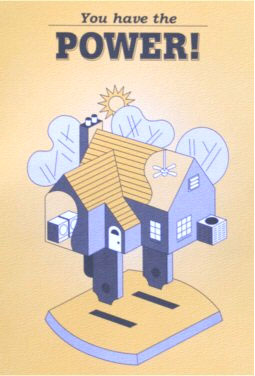TogetherWeSave
The Department of Energy estimates that by 2035 residential demand for electricity will increase 24% above 2008 levels. We want to work with you to keep your electric bill affordable. Find out how you can save by visiting www.togetherwesave.com
You Have the Power

Download your copy of You Have The Power, a free guide to help lower your utility costs by using energy wisely. This guide will give you all the information you need to manage energy effectively in your home or business. Remember, doing all you can to effectively manage energy use will have a direct impact on your energy costs and quality of life. As a co-op member, that’s the kind of power you have. Download your copy here.
Becoming Energy Wise
In this 13-minute video, consumers learn how to reduce their energy costs. The video demonstrates simple, effective improvements to make homes more energy efficient. Contact Bobbi Byford at (469) 376-2234 for more information.
Energy Tips
The following tips will help you make your home safer. more energy efficient and a more comfortable place to live. By following these simple tips, you can be health-wise and energy-conscious.
- Set the thermostat from 76 degrees to 78 degrees in the summer months.
- Set the thermostat from 68 degrees to 70 degrees in the winter months.
- Use fans to circulate air to help stay comfortable.
- Use curtains, drapes or blinds to help control the temperature inside your home.
- Repair or replace broken or cracked windows.
- Change or clean your heating/cooling unit filter once a month.
- Run dishwasher and washing machine only when they are fully loaded.
- Insulate hot water pipes and ducts wherever they run in unheated areas.
- Replace older, inefficient appliances with new energy-efficient models.
Weatherizing
- Put a draft stopper along cracks, beneath doors and windows.
- Place movable insulation in windows to block heat gain during the summer and keep heat indoors during the winter.
- Use caulk and weather stripping around doors and windows to prevent air leakage.
- Install inexpensive gaskets around light switches and electrical outlets to seal against air leaks.
Water Heating
- Check your water heater thermostat setting. If the thermostat is set between 140 degrees and 160 degrees, or “high”, you can reduce the setting to between 110 degrees and 120 degrees, or “medium”, and save at least $20 a year with an electric water heater or $10 a year with a gas water heater. The lower thermostat setting can also prevent scalding.
- Look for and repair leaky faucets.
- Replace your showerhead with a low-flow showerhead. This can reduce the flow of water from 8 gallons to 3 gallons per minute, and save up to 4,000 gallons of water a year.
- Run your dishwasher and washing machine only when they are fully loaded.
- Save even more hot water by using a cold water laundry detergent so you can wash and rinse with cold water. Normally, only very greasy clothes need to be washed in warm or hot water.
Lighting
- Replace two bulbs with one bulb that produces a similar amount of light. For instance, you could replace 60-watt bulbs with one 100-watt bulb. However, be sure that the fixture is rated to use the higher wattage bulb.
- Change to fluorescent lamps wherever possible by replacing the entire fixture or by changing from incandescent to compact, fluorescent bulbs. The initial cost of a compact, fluorescent bulb is more than an incandescent bulb, but it can last up to 12 times longer and produce less heat, which will reduce the load on your air conditioner.
Cooking
- Cook several foods at one time when using your oven. Prepare dishes that can be stored or frozen for later use.
- Bake food in glass pans. Glass pans allow you to reduce the oven temperature by 25 degrees.
- Use small cooking appliances, such as deep fryers, electric skillets, toaster ovens, microwave ovens and pressure cookers. These appliances use less energy than your range or oven.
- Match the size of the pan to the heating element when cooking on the stove. More heat will get to the pan and less will be lost to the surrounding air.
- Place lids on pots when cooking to retain the heat. This will help your food cook faster and keep vitamins from going up in steam.

